Street Mobster Blu-ray Movie
HomeStreet Mobster Blu-ray Movie 
現代やくざ 人斬り与太 / Gendai yakuza: hito-kiri yotaArrow | 1972 | 92 min | Not rated | Aug 07, 2018
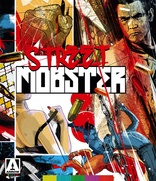
Movie rating
7.3 | / 10 |
Blu-ray rating
| Users | 5.0 | |
| Reviewer | 4.0 | |
| Overall | 4.0 |
Overview
Street Mobster (1972)
A yakuza, who has an untamed rage and lack of respect for authority, finds himself leading the remnants of the gang he once belonged to in order to secure an area of their own.
Starring: Bunta Sugawara, Mayumi Nagisa, Asao Koike, Noboru Mitani, Takeo ChiiDirector: Kinji Fukasaku
| Foreign | 100% |
| Crime | 19% |
| Action | Insignificant |
Specifications
Video
Video codec: MPEG-4 AVC
Video resolution: 1080p
Aspect ratio: 2.35:1
Original aspect ratio: 2.39:1
Audio
Japanese: LPCM 2.0 Mono
Subtitles
English
Discs
Blu-ray Disc
Single disc (1 BD)
Playback
Region A, B (locked)
Review
Rating summary
| Movie | 4.0 | |
| Video | 3.5 | |
| Audio | 3.5 | |
| Extras | 1.5 | |
| Overall | 4.0 |
Street Mobster Blu-ray Movie Review
More threatening than Stays in His Room Mobster.
Reviewed by Jeffrey Kauffman August 7, 2018No matter how “gritty” they ostensibly are, there has often been a perhaps unavoidable glamor to Hollywood depictions of organized crime. Even going back to some of the early vaunted American film industry productions like Little Caesar, The Public Enemy , or the original Scarface, there was a certain glossiness to the proceedings that tended to make the supposed “bad guys” into viscerally compelling characters that shocked some early arbiters of what constitutes “decency”. Though younger audiences may find these early gangster outings downright quaint, even those born well after the epochal sixties and seventies still often relate to some of the most iconic films about criminals made during that era, like Bonnie and Clyde and The Godfather, both of which came under fire (no pun intended) at the time of their releases for what some (again, those gadfly decency monitors) saw as a provocative tendency toward glorifying violence for violence’s sake. There’s perhaps at least a bit of that same kind of disconnect between a supposedly “ripped from the headlines” ambience and an undeniably florid presentational style at hand in 1972’s Street Mobster, a film which kind of interestingly debuted just a few months after Francis Ford Coppola’s first foray into Don Corleone territory, but which purported to be a realistic account of a nascent yakuza member encountering socioeconomic changes in Japan in the wake of the nation’s devastating defeat in World War II. In fact a breakneck montage which starts Street Mobster out on a manic, almost peripatetic, route details that the film’s focal gangster, Isamu Okita (Bunta Sugawara) was born on the very day that Japan officially surrendered in the conflict, an omen which almost instantly provides a kind of “star-crossed” tragic aspect to the story. Within just a few minutes in this freewheeling set of brief vignettes, Okita is shown slapping his “working girl” mother when he was still a child, then growing up to take on various other criminal types, leading to his expected incarceration, where he’s confronted with even more internecine fighting.
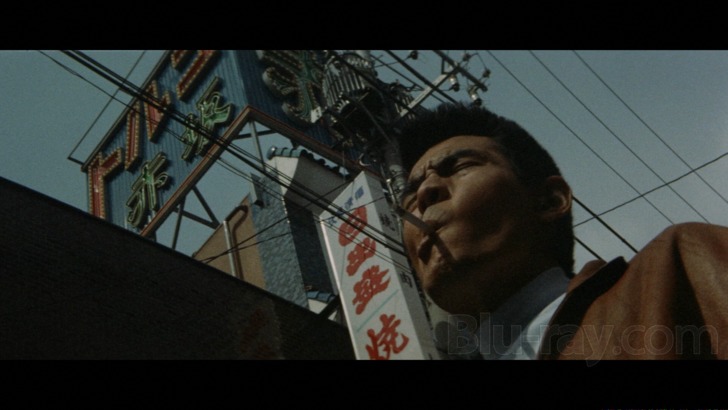
The whole socioeconomic change aspect of Street Mobster may instantly remind some yakuza fans of another film which premiered just a bit after this one did, Battles Without Honor and Humanity, and of course that identification is only furthered with the participation of Bunta Sugawara in each film, as well as the shared participation of director Kinji Fukasaku. Sugawara probably defined this type of character more than (or at least as much as) anyone else in Japanese cinema during this era with appearances in all sorts of at least tangentially similar properties, and in fact it’s kind of hard to think of an analog during this time period in American film. Even going back to the halcyon days of James Cagney and/or Edward G. Robinson, it’s really hard (in my estimation, anyway) to come up with someone who regularly flouted such effortless (and at times almost comical) machismo, making Sugawara’s characters quite often the sort of anti-heroes that you’re kind of secretly rooting for despite their obvious flaws.
The perhaps not so subliminal links to Battles Without Honor and Humanity continue with the post-stir exploits of Okita, who meets a working girl named Kinuyo (Mayumi Nagisa, also in the later Fukasaku film). A kind of tawdry and some might feel provocative backstory links these two characters, though it’s the internecine battles (with or without honor and/or humanity) that propel the plot forward, as Okita attempts to take out rival gangs while maintaining his own control.
You can almost look on Street Mobster as almost a prelude or at least companion piece to the later Battles franchise, but Fukasaku really ups the stylistic parameters with this film, with a camera that’s almost “unhinged” at times, shooting at skewed angles and providing a totally unsettled feeling in an already almost viciously energetic narrative. There may not be the levels of societal “meta” data in this film that arguably informed at least some of the Battles outings, but there is most definitely a kind of Greek Tragedy aspect that plays out, with Okita’s own kind of bizarre combo platter of toughness and loyalty leading to some unexpected carnage.
Still, some may feel there’s at least a bit of a disconnect between a swaggering anti-hero and some of the almost silly (if often frighteningly violent) content that fills this film. There’s an early moment that serves as an example of this perhaps unintentionally comic aspect. Okita’s already up to his neck in street smackdowns, and he appears after one of these interchanges covered with bandages, but disparages the guys surrounding him for not being “pals” when he wants to go take on a new crew of perceived nemeses and they demur, something some may feel is a perfectly reasonable reaction after seeing Okita so covered with wounds. But as with many a Sugawara gangster movie, the lead actor’s overarching swagger is probably enough to take care of most assailants even if “pals” are running the other way.
Street Mobster Blu-ray Movie, Video Quality 
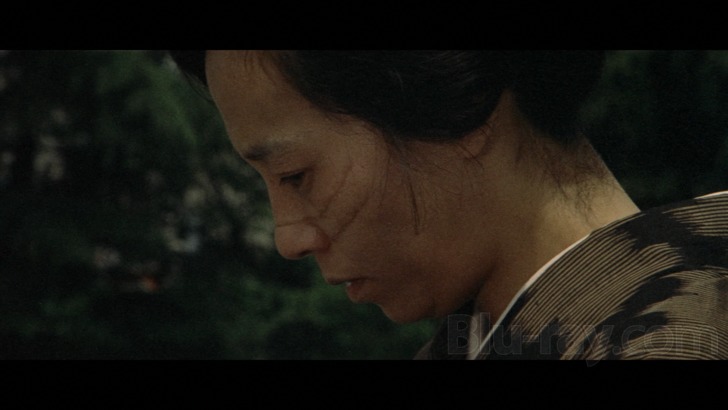
Street Mobster is presented on Blu-ray courtesy of Arrow Video with an AVC encoded 1080p transfer in 2.35:1. Arrow's insert booklet contains only the following fairly generic verbiage about the transfer:
Street Mobster has been transferred in High Definition by Toei Company and the film is presented in its original aspect ratio of 2.35:1.I at least at times haven't been overly impressed with some of these "pre-fab" HD masters provided by Toie that Arrow has released, and there are some of my same concerns with the release of Street Mobster, though I preface some of my following comments with an overall statement that this is certainly the best that I personally have ever seen this film look. While there's generally a very organic appearance here, grain is pretty coarse looking quite a bit of the time (probably exacerbated by the film's tendency to feature a lot of dark or dimly lit material, as can hopefully be seen in the screenshots accompanying this review). That, along with that very darkness, tends to often keep fine detail levels masked, sometimes even when extreme close-ups are being employed. While the outdoor material probably understandably pops the best, here some fading is perhaps even more noticeable, with a kind of brown skewing that can make everything look just slightly dowdy. Fukasaku's tendency toward almost hallucinogenic visuals in this film might be perceived as "softness", and while the transfer certainly doesn't have contemporary levels of sharpness (nor should it), in decent lighting at least detail levels are noticeably improved from the old DVD. Fans of the film are encouraged to look through the screenshots accompanying this review to get a feel for the pluses and minuses of this transfer.
Street Mobster Blu-ray Movie, Audio Quality 
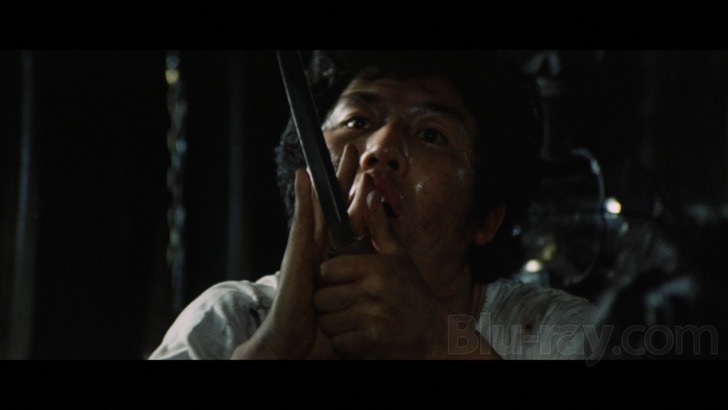
Street Mobster features an LPCM 2.0 mono track in the original Japanese. The film has quite a bit of music which sounds nicely full bodied throughout the presentation, but some of the dialogue can occasionally sound just a trifle on the boxy side. That said, there are no issues at all with dropouts or distortion, and all elements are delivered with decent clarity and no age related issues whatsoever.
Street Mobster Blu-ray Movie, Special Features and Extras 
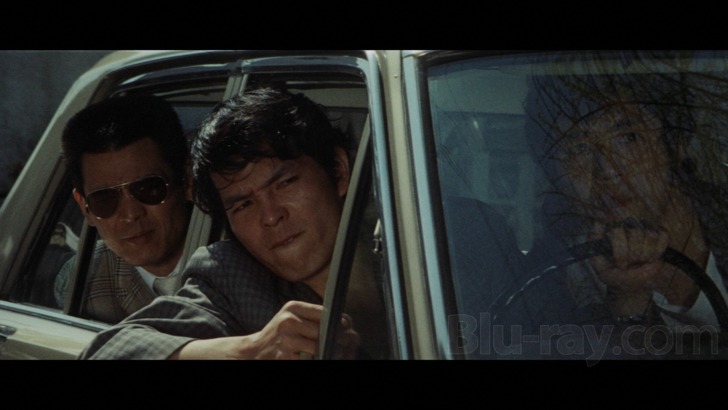
- Audio Commentary by Tom Mes
- Theatrical Trailer (1080p; 2:41)
- Still Gallery (1080p; 1:00)
Street Mobster Blu-ray Movie, Overall Score and Recommendation 
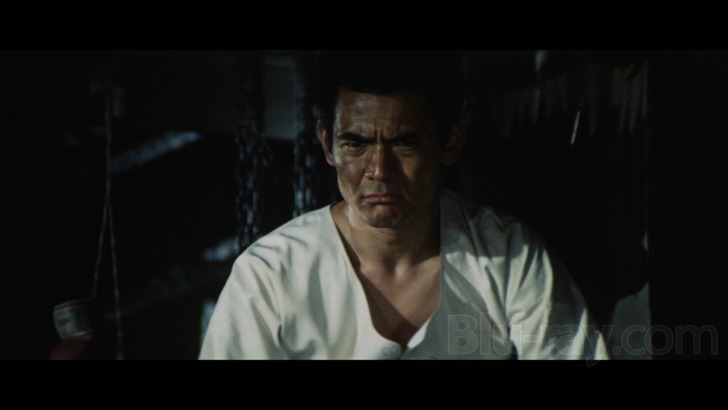
Sugawara and/or Fukasaku fans are probably going to know (if they don't already) pretty much exactly what they're going to get with Street Mobster, and the film is yet another viscerally compelling portrait of a gangster navigating epochal changes not just on the, yes, local street(s), but in a wider context that seems to suggest larger, more sweepingly "meta", changes. Fukasaku really provides a cartwheeling style here (some of the fight scenes with their tilted cameras almost had me expecting to see a "boff" or "pow" a la the old sixties Batman television series), and Sugawara is a strutting, menacing force of nature. Video is a little on the dowdy side, and Arrow hasn't assembled a huge allotment of supplements as they sometimes do, but overall (and especially for yakuza fans) Street Mobster comes Recommended.
Similar titles
Similar titles you might also like

Doberman Cop
ドーベルマン刑事 / Doberuman deka
1977

Hiroshima Death Match
Battles Without Honor and Humanity - Deadly Fight in Hiroshima
1973

Graveyard of Honor
Jingi no hakaba
1975

Graveyard of Honor
Shin jingi no hakaba
2002

Cops vs Thugs
Special Edition | 県警対組織暴力 / Kenkei tai soshiki bōryoku
1975

Proxy War
Battles Without Honor and Humanity
1973

Battles Without Honor and Humanity
1973

Dead or Alive 2
2000

Massacre Gun
Minagoroshi no kenjû
1967

Gangster VIP
1968

Gangster VIP 2
1968

Black Dagger
1968

Kill!
1969

Detective Bureau 2-3: Go to Hell, Bastards!
探偵事務所23 くたばれ悪党ども / Kutabare akutô-domo - Tantei jimusho 23
1963

Eight Hours of Terror
8時間の恐怖 / Hachijikan no kyôfu
1957

New Battles Without Honor and Humanity: The Boss' Head
新仁義なき戦い 組長の首 / Shin jingi naki tatakai: Kumicho no kubi
1975

Stray Cat Rock: Delinquent Girl Boss
1970

New Battles Without Honor and Humanity: Last Days of the Boss
新仁義なき戦い 組長最後の日 / Shin jingi naki tatakai: Kumicho saigo no hi
1976

New Battles Without Honor and Humanity
新仁義なき戦い / Shin jingi naki tatakai
1974

The Violent Professionals
Milano trema: la polizia vuole giustizia
1973